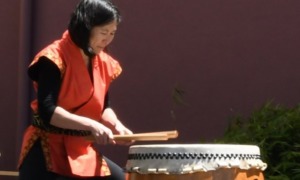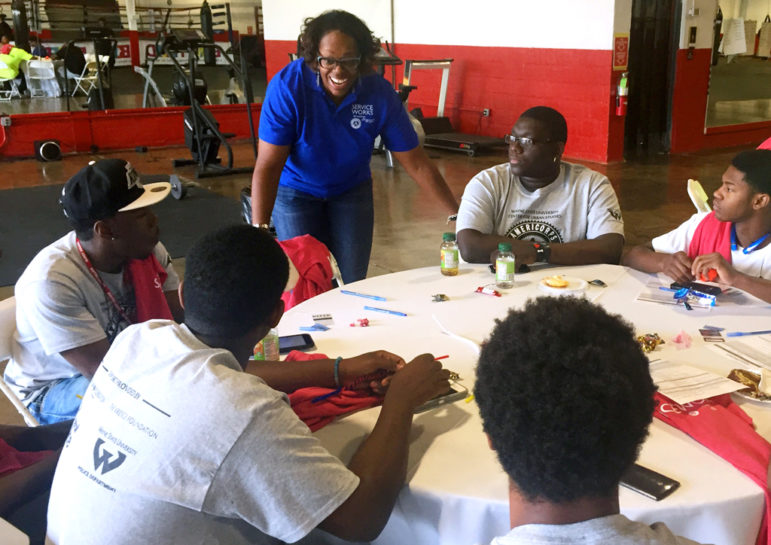
Photos by Jason Meucci
AmeriCorps VISTA Patrice Johnson talks with Detroit youth.
Young people who participate in ServiceWorks — “Service Scholars” — across the United States come from different backgrounds, ethnicities and face different types of challenges. But despite all the differences these 16- to 24-year-olds may have, they are also share many similarities – starting with the desire to better themselves and their community.
So when I traveled to Detroit in late June to team up with other ServiceWorks VISTAs from around the country in hopes of bringing our message and teachings to a new city and a new group of young people, we weren’t quite sure what to expect.
As AmeriCorps members, my fellow VISTAs and I had spent almost a year embedded with local youth-serving organizations, working on the front lines of the program. Our daily work includes everything from facilitating the ServiceWorks curriculum, to coordinating service projects with community partners, to recruiting volunteers and the Service Scholars themselves.
But the Scholars are why we do what we do. This program year alone, we’ve engaged more than 5,000 young people who made the commitment, through our program, to improve their college and career readiness through volunteering and service.
As VISTAs working with this population across 10 diverse cities, we were curious how inner-city youth from Detroit might be similar to – or different than – those we’re used to working with in our hometowns.
Empowering youth to overcome helplessness
We were there for a “ServiceWorks Skill-Building Bootcamp” — a daylong event designed to empower youth by boosting their leadership and communication skills, expanding their networks, teaching them about goal-setting and how to apply project management techniques to accomplish those goals.
Listening to the Detroiters tell us what troubles them and their communities most was rough. They spoke of regularly bearing witness to blight, homelessness, drug use, gang life, police brutality, teen pregnancy and gun violence. Unfortunately – for the young people we serve in places like Newark, New Jersey; Oakland, California; and St. Louis, many of those things are all too familiar.
In other cities, young people have told us they’re more concerned with things like graffiti, general safety, domestic violence, animal cruelty and access to quality food and healthcare. No matter what the location or issues, they say they often feel powerless to do anything about those societal troubles.
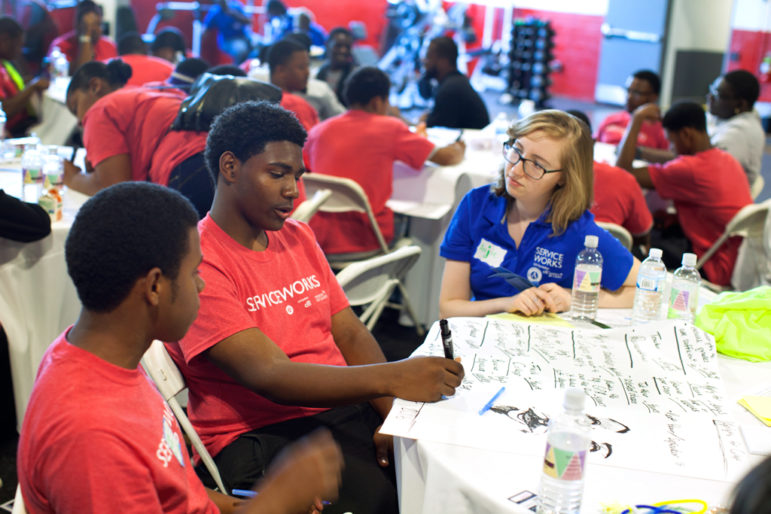
AmeriCorps VISTA Anjie Diaz believes a willingness to listen to a young person can often make them more receptive to your message.
Scholars work together on a community project
That’s where one of our key messages comes in: When youth and young adults are provided a platform that empowers them to be changemakers within their community, they begin to realize a new level of self-worth. We believe volunteer service can be one of those platforms.
That’s why each ServiceWorks Bootcamp, like the one held in Detroit, includes a service project that gives participants an opportunity to understand how they can directly impact their community.
The young people at our event, like those back in my hometown of Newark, started the day shy and guarded. My colleagues and I are used to this. So we’ve developed an approach to get them to lower those walls and buy in. And that’s not always easy.
“You have to really work to feel out the relationships in order to connect with them,” says my colleague Alonzo Warren, a ServiceWorks VISTA in Los Angeles. “Our job is to be intentional with them — make the idea of volunteer service tangible and valuable.”
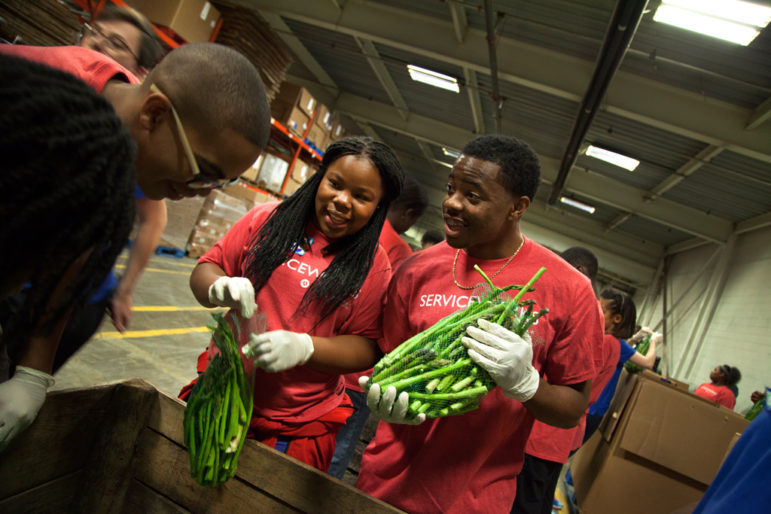
Participating in service projects empowers young adults, like Detroit’s Heather and Jerome, with a sense of value to their community.
When you can do that, the experience not only creates a bigger impact, it becomes more fun for a young person. Learning how to be an engaged leader, practicing different communication styles and peer-to-peer networking helps Scholars relate to the content and to each other. They begin to understand how they can make a difference in their community and help themselves in the process.
One young man, a student at nearby Wayne State University, said he was on summer break and finding it hard to get a job in a city with one of the highest youth unemployment rates in the country. So I shared with him some facts about volunteering and its connection to finding employment, and through his facial expression, you could immediately see a light go on.
Different cities, same takeaways
We like to think ServiceWorks may look a little different from city to city, depending on what issues youth are dealing with specific to their local environment. But when it comes to overall takeaways, the program feels very much the same no matter where you go.
Even in just one day, Scholars in Detroit realized many of the same things their peers around the country have:
- Soft skills have real value in their daily lives.
- Project planning can be applied to reaching personal and academic goals.
- Volunteering to help others shows them the value they have in their community.
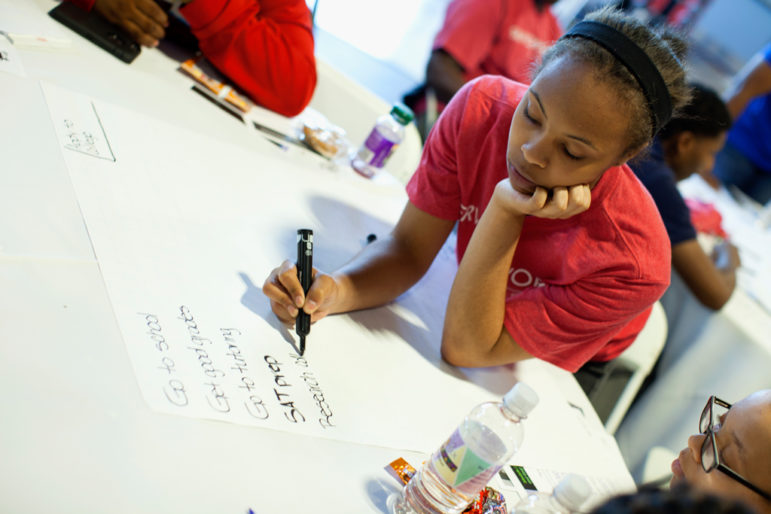
Goals like getting into college may seem daunting for disconnected youth. Project management techniques help break the process down into smaller steps that feel more attainable.
It’s that care for neighborhoods, no matter how disadvantaged they may be, where my colleagues and I observed the most striking – and possibly most important – similarity to the youth we work with around the country.
Anjie Diaz, a ServiceWorks VISTA in New York, summed it up best: “I saw a lot of thoughtful social engagement. They’re thinking about their community. And they’re wondering about ways they can enact some changes on their own. They want things to be better.”
Patrice Johnson is an AmeriCorps VISTA with ServiceWorks at Jersey Cares in Newark. She’s spent the past year there helping underserved youth develop their leadership and workplace skills, build their networks and establish connections with their community – while dealing with unique issues created by their environment.
ServiceWorks is a national program of Points of Light, AmeriCorps and the Citi Foundation that uses community engagement and volunteer service as pathways to help disconnected 16- through 24-year-olds in 10 cities develop the skills they need to prepare for college and careers. ServiceWorks Scholars and VISTAS will share their stories throughout the coming school year through Youth Today. Connect with ServiceWorks @IamServiceWorks.




